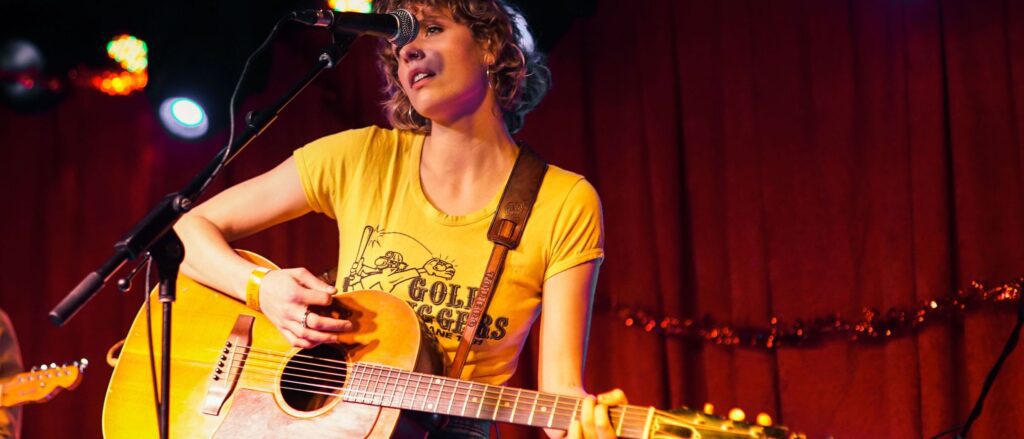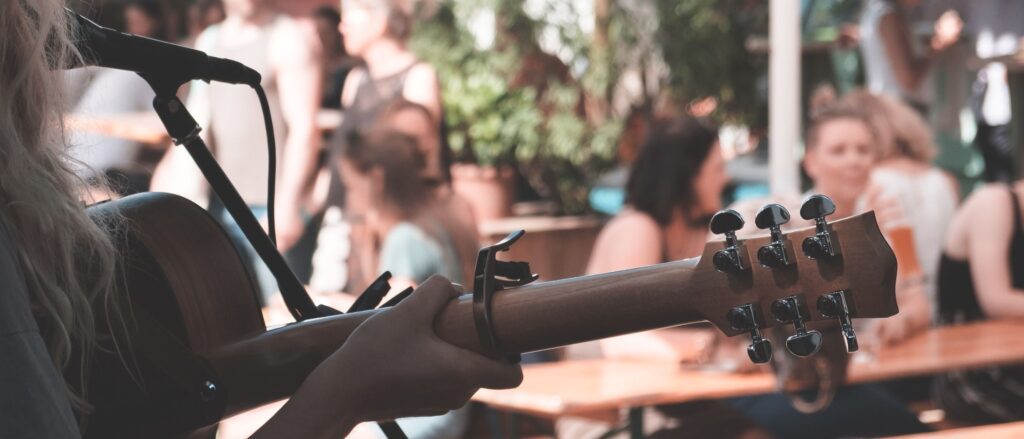Performing in an open mic is one of the best things you can do for yourself, both professionally and personally, as I discuss extensively in my book Unleash Your Inner Rock Star. Going to open mics will help you expand your social network, deal with stage fright, get out of your comfort zone, and get feedback on your performance. The problem is, sometimes there will be no open mics in your area. Or you can’t find an open mic that accommodates bands. Or all the open mics in your area start at 10 pm but you and your friends have day jobs that start early.
If any of the cases above is true for you, you should consider running your own open mic. Starting an open mic is most often done by experienced musicians, but you can give it a go nonetheless or look for a more experienced musician to join you in co-managing the open mic. You can be in charge of finding the venue and inviting people, and she will be in charge of the technical aspects – connecting the equipment, balancing the live sound, and more.

How to find a venue for your open mic
Your best bet is to approach a bar that already runs live music shows so it has the basic equipment. Venue acoustics are a big deal, and many places that don’t hold live music shows regularly will not be a good fit.
That being said, the social aspect is more important than the sound. If you can’t find a live music venue that’s interested in hosting your open mic, you can approach any bar/café/restaurant and offer them to run such an event. I’ve seen restaurants with no sound infrastructure whatsoever host open mics, by hooking up a guitar and a mic into a portable amp. Some of these venues create a stage-like area that doesn’t even have to be elevated (they put a chair for the performer beside the amp and the mic, and that’s it). In this case, you might have to get all the gear and bring it with you to the event. For an acoustic open mic you will need:
- A portable amplifier
- A microphone stand
- A dynamic microphone
- An amplified acoustic guitar
A full band setting is of course more complicated and will require more gear, including a drum kit, so I don’t recommend you initiate a full-band open mic on your own (unless you have the relevant experience).
When you approach venues and offer them to host your event, remember that businesses will be more inclined to try your open mic thing if:
- They have slow nights in which they hope to get more people,
- They believe the people you can bring will be a good fit for the venue,
- The risk of turning the other patrons away is low (some people are not big fans of open mics, and they might leave to go somewhere else if they walk into a restaurant and find it is an amateur musician night).
If you can’t find a venue, you can take your open mic to the street or the park. You will need the same gear, and you’ll also have to check local regulations about street performances and noise.

Offer venues a low-commitment deal they can benefit from
Approach the businesses with an offer and emphasize the low commitment on their end. Offer a try-out night or a try-out period before they commit to making your open mic a recurring event.
Venues that host open mics think of you as a promoter. They expect you to bring people and they expect that the people you bring will purchase food and drinks (in the case that there is no cover charge). Here you might encounter a challenge – the average open mic crowd doesn’t like spending much money. Musicians without day jobs are often strapped for cash and don’t feel like spending much money every single time they go out to an open mic, and some of them refrain from eating and drinking before a performance.
I’ve seen stage addicts go to open mics every single night of the week and just ask for a free glass of water in the venue. I’ve even seen an instance in which an open mic manager asked a guy to stop coming to the open mic unless he started to order something from the menu. The guy got mad and said that he should be paid or at least given free food and drinks, as he was performing for free…
Even though he was good, that was a misunderstanding of the situation on the performer’s end. The open mic is for the performers, not for the other patrons. The other patrons couldn’t care less about random people with varying levels of talent going on stage and playing average songs with an average sound system and an average soundperson. Unless they are your friends, they don’t give a s**t about your performance.
Do you think you will be able to somehow bring diners and heavy drinkers to your open mic night? If yes, mention it when you negotiate with the venue. The nature of your expected crowd is part of the deal.
Promote your event
After you seal the deal, promote it any way you can – on WhatsApp, Facebook profiles and groups, relevant listings, etc. Go to other open mics and connect with the performers.
Make sure that the venue is promoting it as well. Be careful not to spam your friends too much though. They might enjoy going out to your event, but if they keep rejecting you politely let it go – I’ve seen too many promoters lose friendships when they tried to bring their friends to events at any cost.
Be patient
Finding a venue for an open mic, and getting it to stand on its own (=attract people you don’t know and hear about it organically), takes time. Be patient, and try to focus on the fun and not on the rejections you will likely get from venues and invitees.
If you have a good story about starting your open mic, I’d love to hear about it!